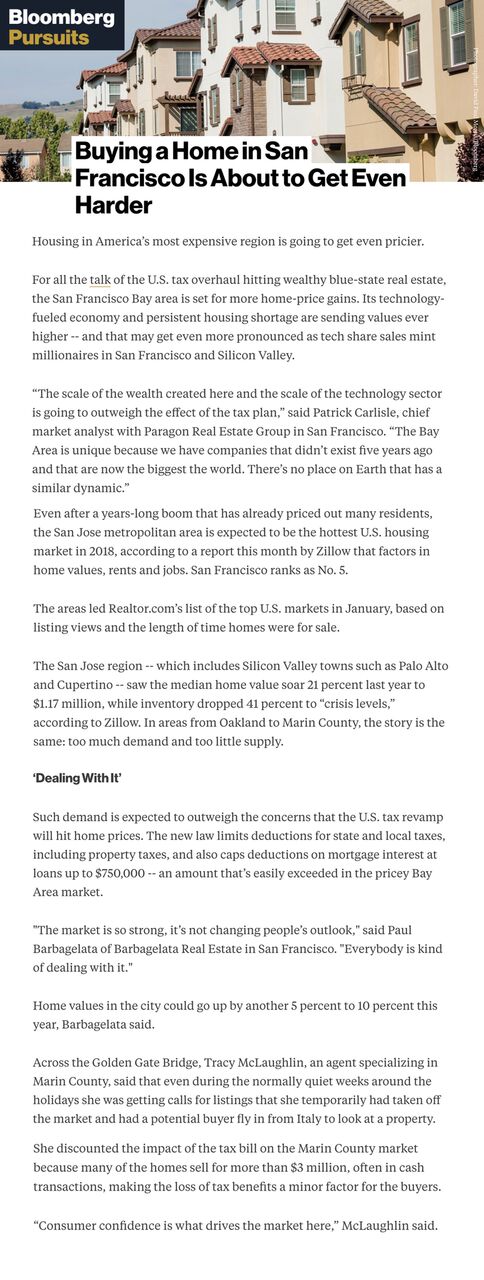

Buying a Home in San Francisco Is About to Get Even Harder

Housing in America’s most expensive region is going to get even pricier.
For all the talk of the U.S. tax overhaul hitting wealthy blue-state real estate, the San Francisco Bay area is set for more home-price gains. Its technology-fueled economy and persistent housing shortage are sending values ever higher -- and that may get even more pronounced as tech share sales mint millionaires in San Francisco and Silicon Valley.
“The scale of the wealth created here and the scale of the technology sector is going to outweigh the effect of the tax plan,” said Patrick Carlisle, chief market analyst with Paragon Real Estate Group in San Francisco. “The Bay Area is unique because we have companies that didn’t exist five years ago and that are now the biggest the world. There’s no place on Earth that has a similar dynamic.”
Even after a years-long boom that has already priced out many residents, the San Jose metropolitan area is expected to be the hottest U.S. housing market in 2018, according to a report this month by Zillow that factors in home values, rents and jobs. San Francisco ranks as No. 5.
The areas led Realtor.com’s list of the top U.S. markets in January, based on listing views and the length of time homes were for sale.
The San Jose region -- which includes Silicon Valley towns such as Palo Alto and Cupertino -- saw the median home value soar 21 percent last year to $1.17 million, while inventory dropped 41 percent to “crisis levels,” according to Zillow. In areas from Oakland to Marin County, the story is the same: too much demand and too little supply.
Share Sales
Home prices will keep rising as more startups go public or sell shares privately, generating cash for tech investors and workers, according to Carlisle. Dropbox Inc., the San Francisco-based file-sharing company valued at $10 billion, has filed confidentially for an initial public offering and aims to list in the first half of the year, according to people familiar with the matter. Investors led by SoftBank Group Corp. this month completed an $8 billion purchase of stock from Uber Technologies Inc. shareholders, bringing a flush of money to early investors in the massive startup. The Japanese conglomerate, meanwhile, is hungry for more deals.
In San Francisco, low unemployment, at 2.2 percent, and the expansion of large employers such as Dropbox, Facebook Inc. and Google is likely to ensure demand for housing will continue outstrip supply. The median house price in the city soared 11 percent to a record $1.5 million in the fourth quarter, while the average time it took to sell fell to two weeks from 22 days a year earlier, according to a Paragon report.
San Francisco Soars
Tech fuels home prices that far exceed the rest of the state and country
The rapid speed of transactions came as a surprise to Tania Fowler, who in September sold the Edwardian three-story house she grew up in. The Inner Sunset home, which sold for $200,000 above the asking price in an all-cash deal, was on the market for two weeks.
“From the time we accepted the offer to close of escrow was seven days,” Fowler said. “I used to sell real estate in the Sacramento area and had seen 20-day COEs at the height of the market bubble, but never seven days.”
At the high end of the market, with prices above $3.5 million, there’s already preparation for IPOs, said Gregg Lynn, an agent with Sotheby’s International Realty in San Francisco. Several executives with high-tech companies have hired agents at his brokerage to locate homes for them in anticipation of “liquidity events” in the near future, he said.
“They want properties ready to go,” Lynn said.
‘Dealing With It’
Such demand is expected to outweigh the concerns that the U.S. tax revamp will hit home prices. The new law limits deductions for state and local taxes, including property taxes, and also caps deductions on mortgage interest at loans up to $750,000 -- an amount that’s easily exceeded in the pricey Bay Area market.
"The market is so strong, it’s not changing people’s outlook," said Paul Barbagelata of Barbagelata Real Estate in San Francisco. "Everybody is kind of dealing with it."
Home values in the city could go up by another 5 percent to 10 percent this year, Barbagelata said.
Across the Golden Gate Bridge, Tracy McLaughlin, an agent specializing in Marin County, said that even during the normally quiet weeks around the holidays she was getting calls for listings that she temporarily had taken off the market and had a potential buyer fly in from Italy to look at a property.
She discounted the impact of the tax bill on the Marin County market because many of the homes sell for more than $3 million, often in cash transactions, making the loss of tax benefits a minor factor for the buyers.
“Consumer confidence is what drives the market here,” McLaughlin said.
Some Worries
Still, there’s plenty of concern about the tax law’s effect in the heart of Silicon Valley, according to Michael Repka, chief executive officer of DeLeon Realty in Palo Alto. Earlier this month, about 850 people showed up for a real estate tax seminar his company organizes, compared with the 60 to 80 people such events normally draw, he said. Some people he’s talked to are considering selling their home and moving out of state to save money on taxes, Repko said.
“These are retired people but also people with more flexible work arrangements,” Repko said. “Some people are considering selling because they are worried about prices falling.”
The ultimate effect on people’s taxes might be close to zero, however, because homebuyers in the Bay Area tend to be wealthy individuals who also stand to benefit from reductions in their federal tax rate, said Ralph McLaughlin, chief economist for Trulia. In addition, these people may make homebuying decisions on other factors, such as family and status, he said.
“We have a healthy economy, with a healthy, often well-compensated workforce boosting demand,” McLaughlin said. “Unless there’s a major correction in the tech sector, we’ll see prices continue to go up.”